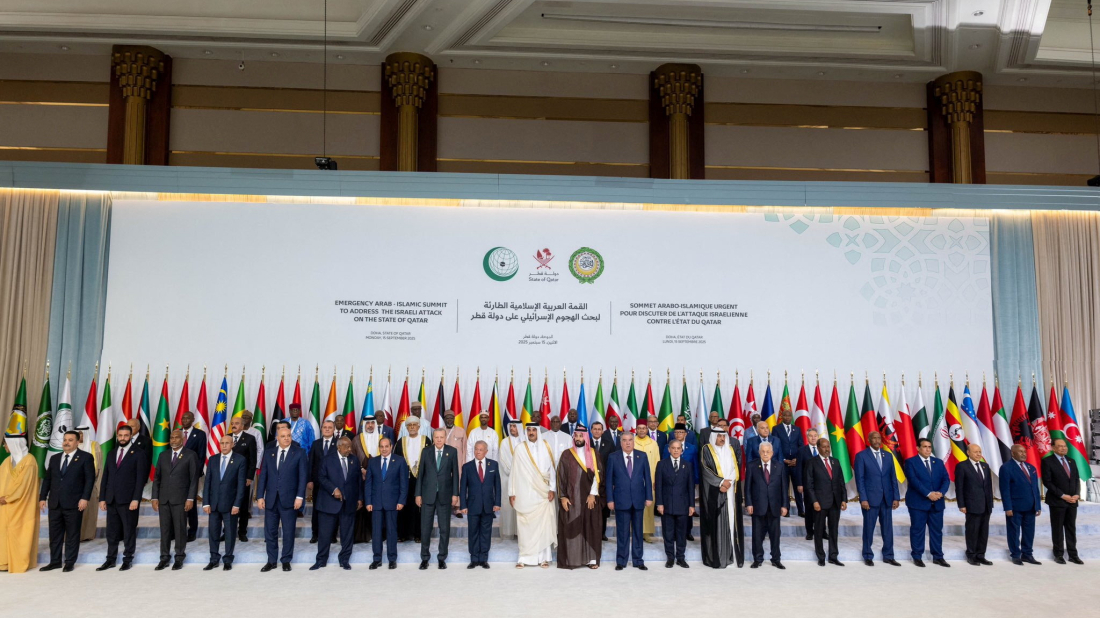Iran signs €500 million arms deal with Russia to restore air defences, FT reports
Iran has signed a secret €500 million arms deal with Russia to rebuild air defences, weakened during last year’s war with Israel, the Financial Ti...

Leaders from the 57-member Organisation of Islamic Cooperation and 22-member Arab League met in Doha on Monday, concentrating on the impact of recent attacks on Qatar and the wider Middle East, and calling for coordinated measures to preserve stability and support ongoing mediation efforts.
Participants emphasised that lasting peace requires respecting international mediation efforts and addressing the Gaza conflict, calling for adherence to the Arab Peace Initiative and relevant United Nations resolutions. They also urged the international community, including the UN Security Council, to set a clear timetable for ending the occupation and to take urgent action to halt attacks.
Qatar’s Emir Sheikh Tamim bin Hamad Al Thani condemned the recent bombing in Doha. He warned that such actions threaten negotiations aimed at ending the Gaza conflict and called for the protection of the city’s sovereignty.
Azerbaijan’s Foreign Minister Ceyhun Bayramov expressed support for Qatar’s sovereignty and mediation role, highlighting the need to revive talks in Gaza and achieve a durable ceasefire. He noted Azerbaijan’s humanitarian contributions, including $2 million in aid to Palestine since 2023, alongside education and health projects, and reiterated support for a two-state solution.
Turkish President Recep Tayyip Erdogan described the attack as unacceptable and reaffirmed Türkiye’s backing for Qatar’s mediation efforts. He pledged to strengthen bilateral ties with Doha, particularly in defence and security.
The Gulf Cooperation Council (GCC) pledged to review the organisation’s defence posture and activate “joint defence mechanisms and Gulf deterrent capabilities.” The GCC, which includes Bahrain, Kuwait, Oman, Qatar, Saudi Arabia, and the UAE, affirmed full solidarity with Qatar and condemned the attack in the strongest terms.
Observers noted the absence of statements from the Abraham Accords signatories — the UAE, Bahrain, and Morocco — and that Saudi Crown Prince Mohammed bin Salman did not address the summit, falling short of expectations from several Arab capitals and Palestinian representatives.
The summit also voiced support for ongoing mediation efforts by Qatar, Egypt, and the United States.
A seven-month-old Japanese macaque has drawn international attention after forming an unusual bond with a stuffed orangutan toy after being rejected by its mother.
Divers have recovered the bodies of seven Chinese tourists and a Russian driver after their minibus broke through the ice of on Lake Baikal in Russia, authorities said.
President Donald Trump said on Saturday (21 February) that he will raise temporary tariffs on nearly all U.S. imports from 10% to 15%, the maximum allowed under the law, after the Supreme Court struck down his previous tariff program.
Pakistan said it carried out cross-border strikes on militant targets inside Afghanistan after blaming a series of recent suicide bombings, including attacks during the holy month of Ramadan, on fighters it said were operating from Afghan territory.
Iran announced on Saturday (21 February) that it has designated the naval and air forces of European Union member states as “terrorist entities” in a reciprocal move after the EU blacklisted the Islamic Revolutionary Guard Corps (IRGC).
Further Iran-U.S. nuclear talks are scheduled in Geneva on Thursday (26 February) as diplomacy resumes over Tehran’s nuclear programme following earlier mediation efforts. But will the talks move Iran-U.S. negotiations closer to a deal, and what should be expected from the meeting?
China says it's making a "full assessment" of the U.S. Supreme Court's tariff ruling and urged Washington to lift "relevant unilateral tariff measures" on its trading partners, the Chinese commerce ministry said in a statement on Monday (23 February).
Start your day informed with AnewZ Morning Brief. Here are the top news stories for the 23rd of February, covering the latest developments you need to know.
A “Victory will be ours” banner was hung on the Russian Embassy in Seoul, ahead of the fourth anniversary of Russia’s full-scale invasion of Ukraine. It remains on display despite a request from the South Korean Foreign Ministry on Sunday (22 February) for its removal, sparking widespread criticism.
North Korea’s Workers' Party of Korea has re-elected Kim Jong Un as general secretary during the party congress in Pyongyang state media reported.
You can download the AnewZ application from Play Store and the App Store.

What is your opinion on this topic?
Leave the first comment